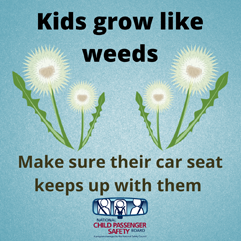Used, Expired and Crashed Seats:
Used seats: Has someone offered you a car seat or booster they no longer need? How do you know if the seat is okay to use for your child?We recommend asking these questions:
- Is the seat appropriate for the child's age, weight, height, and developmental level?
- When does it expire?
- Has it ever been in a crash? Some manufacturers require replacement after any crash. Any child safety seat must be replaced after a crash that wasn’t minor.
- Has the seat been recalled? Check the National Highway Traffic Safety Administration’s website - NHTSA (.gov). If the seat was recalled, did the caregiver take the action needed to address the recall?
- Is it in proper condition - no fraying of fabrics, rust on metal parts, or cracks/stress marks on plastic parts?
- Was the seat cleaned only in accordance with the manufacturer’s instructions?
Remember, a seat from a good friend or family member is a very different thing than a seat from a stranger. If you accept the seat, read the car seat manual (ideally this would be with the seat, but if not, manuals are usually available on the manufacturer’s website) and your vehicle owner’s manual for proper use, and register the seat with the manufacturer in your name.
Remember, you are, TRUSTING this seat with the LIFE OF YOUR CHILD!
If in doubt, swap it out! Call (888) VMT-SEAT - Toll Free for help!
Expired seats: Sometimes expired seats are seen at our fitting stations and inspections. When talking with parents and care givers, we frequently hear “I don’t believe that I need a new one - it’s just marketing on behalf of the manufacturer in order to get me to buy another. “This is simply not true - seats have good reasons for their expiration dates.
Car seats live in extreme environments, the very hot and very cold of a car. These temperature swings cause the plastic, over time, to become brittle and fail which can cause the harness to pull through the shell of the car seat and eject the child.



